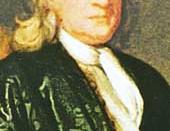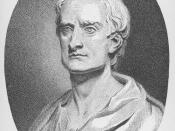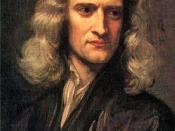Sir Isaac Newton and Gottfried Wilhelm Leibniz are two of the most supreme intellects of the 17th century. They are both considered to be the inventors of Calculus. However, after a terrible dispute, Sir Isaac Newton took most of the credit.
Gottfried Wilhelm Leibniz (1646-1716) was a German philosopher, mathematician, and statesman born in the country of Leipzig. He received his education at the universities of Leipzig, Jena, and Altdorf. He received a doctorate in law. He devoted much of his time to the principle studies of mathematics, science, and philosophy.
Leibniz's contribution in mathematics was in the year 1675, when he discovered the fundamental principles of infinitesimal calculus. He arrived at this discovery independently at the same time along with the English scientist Sir Isaac Newton in 1666. However, Leibniz's system was published in 1684, three years before Newton published his. Also at this time Leibniz's method of notation, known as mathematical symbols, were adopted universally.
He also contributed in 1672 by inventing a calculating machine that was capable of multiplying, dividing, and extracting square roots. All this made him to be considered a pioneer in the development of mathematical logic.
Sir Isaac Newton is the other major figure in the development of Calculus. He was an English mathematician and physicist, who are considered to be one of the greatest scientists in history. Newton was born on December 25, 1642 at Wools Thorpe, near Grantham in Lincolnshire. He attended Trinity College, at the University of Cambridge. He received his bachelor's degree in 1665 and received his master's degree in 1668. However, there he ignored much of the universities established curriculum to pursue his own interests: mathematics and natural philosophy. Almost immediately, he made fundamental discoveries in both areas.
Newton's discoveries were made up of several different things. It consisted...



Not a very argumentative essay
i didn't think that this was a very argumentative essay. i mean some of the arguments seemed weak and just unexpected. i just didn't feel like it was supported by major evidence. nonetheless it was an ok paper.
0 out of 0 people found this comment useful.